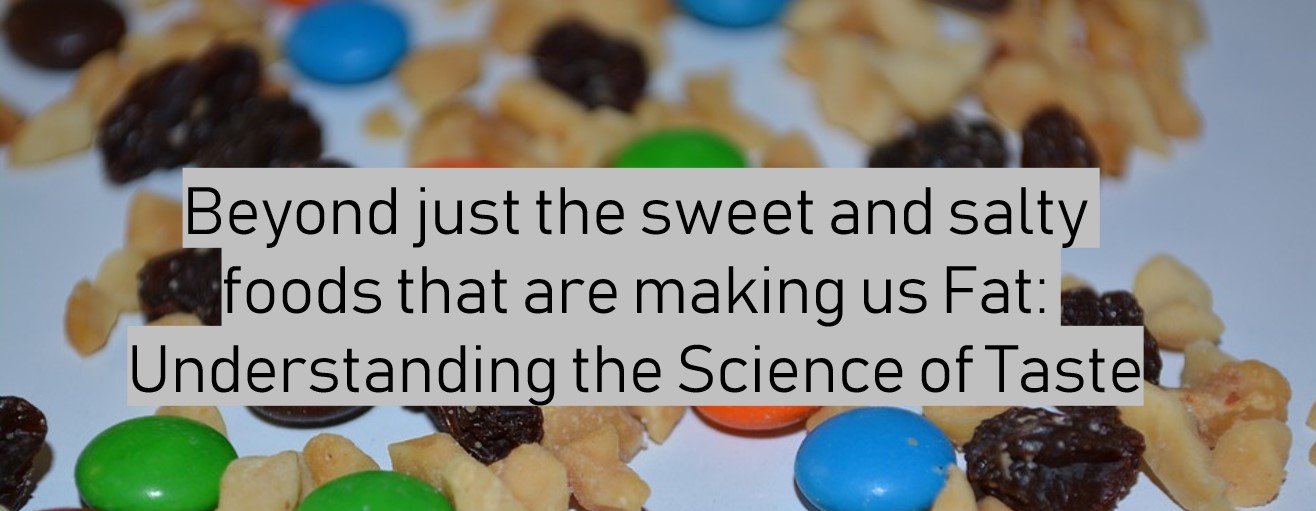Beyond just the sweet and salty foods that are making us Fat: Understanding the Science of Taste
One of the reasons obesity is on the rise is evidently because food tastes so good. We become addicted to the sweet taste of donuts or the fatty, salty taste of chips—sometimes to the point of cursing our own tastebuds as being our own worst enemies.
Imagine if food had no taste: It could potentially be the solution to a huge problem, right?
Not. So fast.
Taste might play a bigger role in how our bodies function than just sending us into food comas, and ultimately making us fat.
For one, it is believed that taste evolved to protect us from eating poisonous things, and to make sure we get the calories and the nutrients we need. Similarly, there’s a theory called nutrient deficiency theory that suggests that we crave foods our bodies need, especially when we’re low or deficient in certain vitamin or minerals.
Have you ever gone for a long run in the sun and found yourself craving salty foods that evening? Chances are you’re low on sodium and it’s your body’s way of telling you to get some sodium in you.
Beyond taste being a way of subconsciously speaking to us to keep us healthy, there’s another theory about taste that suggests even just tasting food without actually swallowing it, can have a powerful effect on our bodies.
There’s some interesting research that has been done on taste and athletic performance that suggests just rinsing your mouth with a carbohydrate solution affects performance. In fact, multiple studies have looked at this.
Here are three of them:
• This 2014 study (https://www.ncbi.nlm.nih.gov/pmc/articles/PMC3916844/) shows a link between a carbohydrate mouth wash and exercise of at least one hour in duration.
• This 2004 study (https://www.ncbi.nlm.nih.gov/pubmed/15570147) also discovered a link between a carbohydrate mouth wash rinse and a one hour time trial.
• This 2011 study (https://www.ncbi.nlm.nih.gov/pubmed/21615187) also found similar results.
During this type of research, athletes are usually asked to swoosh around a sweet-carbohydrate solution in their mouths and then spit it out. Interestingly, their bodies react as if they swallowed the solution, and they perform better with the mouthwash than without.
Other research on the topic has injected athletes with a glucose solution right into their blood—meaning they never actually tasted the solution—and it has zero affect on their performance even though their bodies absorbed the carbohydrate solution. Thus, scientists believe there’s a strong connection between the mouth and our tastebuds and our brain and body.
This helps to explain why many endurance athletes—who become hypoglycaemic after a long event and feel dizzy and weak like they’re about to hit the wall—report that all they have to do is put carbs into their mouths and they instantly feel reduced symptoms!
Researchers think it comes down to the fact that tasting something sweet turns on areas of the brain associated with movement. Thus, we may actually have to taste something for it to have the most affect on our bodies.
So, do don’t be cursing your taste buds for causing your sugar addiction or recent weight gain. Clearly we taste food for well-intentioned reasons…
That being said, it is also very possible to change your tastebuds so you stop craving the things you know you shouldn’t be eating. Here are a three tips into tricking your tastebuds to want healthier foods:
1. Simmer down on the sugar
The more crap foods you eat, the more your taste buds want them, and the more you need them to satisfy that urge. The opposite, however, also rings true. Let’s say, for example you currently put 3 tsp. of sugar in your coffee. Try weaning yourself down to 2 tsp. for a month. And then just 1, and then eventually no sugar and you’ll find yourself adjusting to it and enjoying coffee without sugar the way you used to enjoy your sugary coffee.
2. Don’t give up
Not only do your tastebuds change every seven years, there’s also evidence that if you keep trying food that you know is good for you, eventually your tastebuds will stop disliking it.
3. You eat with your eyes
There’s evidence that people rank dinners that look pretty higher in taste than those that don’t. So put some effort into making your food look tasty—think a bad ass salad with six different, brightly coloured vegetables versus some wilted-looking broccoli on a plate. When it looks appealing, it tends to taste more appealing.
Taste doesn’t have to be your own worst enemy: It’s up to you to shape it in a way that helps your life instead of hinders it.







